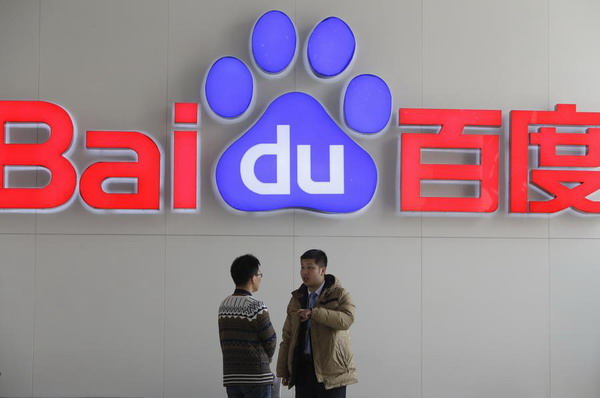
China's largest alliance of private hospitals has decided to take a step back in a high-profile confrontation with Baidu Inc, China's dominant search-engine operator.
 |
| People talk in front of Baidu Inc, which operates China's most popular Internet search engine, in Beijing.[File Photo] |
The Putian (China) Health Industry Chamber of Commerce (PHICC) issued a notice on Wednesday night saying its boycott against Baidu would terminate at midnight to leave room for further negotiation aimed at jointly creating a sound health industrial environment, according to a report by technology portal TechWeb.
PHICC also noted that if the two sides can't reach a consensus in the next stage it will take a "stronger action".
The u-turn by PHICC, to the surprise of many, came just days after it declared to boycott Baidu's "bidding ranking", an advertisement scheme that charges clients for more prominent places in search results.
Following a membership meeting on April 4, PHICC ordered all of its members to stop paying Baidu, noting that high spending on marketing is no longer consistent with the development of the healthcare industry.
Both sides are leaders in their own fields. PHICC comprises more than 8,500 members, or eighty percent of China's private hospitals. Baidu takes up over 70 percent of the search engine market share in China.
Baidu responded fiercely to PHICC's boycott the next day, revealing that many of its "bidding ranking" hospital clients have received online threats from PHICC hospitals asking them to break up with Baidu, too. Otherwise, PHICC threatened a massive clicking campaign to skyrocket their advertisement fees and even to physically harm medical staff.
Baidu said it has reported the case to police, and assured the threatened clients that it is fully and technically capable of preventing malicious clickings.
TechWeb cited an insider who predicted that PHICC would reconcile with Baidu and is likely to come back as a client because "the cost of?a feud with Baidu is too much".
The relationship between Putian's hospitals and Baidu was, at least on the surface, pretty sweet at one time.
Putian's private hospitals spent as much as 12 billion yuan ($1.9 billion)?on Baidu's bidding ranking in 2013, accounting for 46 percent of the internet giant's advertisement income for the year, according to Liang Jianyong, then Party chief of Putian.
Dominating Baidu's search results helped to lead to estimated gross revenue of some 260 billion yuan for PHICC, figures show.
The Putian hospital brand's reputation, however, did not improve in public reviews. To the contrary, it is notorious for poor ethics as well as rampant medical fee frauds.
The final straw for their cooperation was when Baidu scrutinized the hospitals on its bidding ranking earlier this year, and subsequently pulled some of them off the listing for breaching industrial norms.
In a March 26 statement on Weibo, Baidu asserted its "unswerving stance" on a stricter quality inspection on subpar hospitals in its rankings, adding that it declined more than 13,000 bids by hospital clients last year, 60 percent of which were with the Putian coalition.